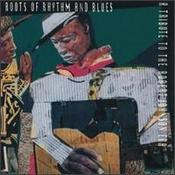
In 1991, the Smithsonian Institution's annual
Folklife Festival presented, as one of the featured presentations of the Festival, The Roots of Rhythm and Blues: A Tribute to the Robert
Johnson Era. I was fortunate enough to attend and had the pleasure to see a number of captivating workshops and performances. I still recall folklorist and scholar Worth Long asking Robert Lockwood and Johnny Shines about songs Robert Johnson performed but never recorded. That was the first time I heard of Hacksaw
Harney who Robert Lockwood Jr said was one of the few guitarists other than his step-father who impressed Lockwood. There was marvelous music whether Ruth Brown on the first day singing accompanied by Robert Lockwood, or
Vernell Townsend (accompanied by husband Henry) singing
Stormy Monday as if Walter Davis had recorded that number. Of the artists I had not heard previously, Eddie
Cusic stood out with his straight-ahead Delta style blues. Some music from that festival was issued on a Sony-Legacy album which only hinted at the music performed and collected. I reviewed it back in 1992 and here is my review as printed in
Jazz and Blues Report out of Cleveland. (
www.jazz-blues.org)
Roots Of Rhythm And Blues A Tribute To The Robert Johnson Era
Sony - Columbia
This release from Sony/Columbia, in conjunction with Smithsonian/Folkways, documents the program that was part of the 1991 Smithsonian Folklife Festival. Those fortunate enough to attend the festival will remember some of these performances and the workshops, oral history and performers not represented here. In addition to associates of Robert Johnson, like the late Johnny “Ned” Shines, Robert Jr. Lockwood, David ‘Honeyboy’ Edwards and Henry Townsend, a variety of delta blues and traditional African American performers were presented including Lonnie Pitchford, Jessie Mae Hemphill, and others. In addition to festival performers, there are ringers here. While Phil Wiggins appeared at the Festival, John Cephas did not. While I originally thought Cephas and Wiggins’ fine Brownsville Blues was from an earlier festival, I have been told this is a studio performance with dubbed-in applause. Toshi Reagon is heard on another studio recording, albeit without dubbed crowd noise. The centerpiece of the performances are several loose jams credited to Johnny “Ned” Shines (with these being his last “official recordings”) and ensemble. The ensemble includes Townsend on piano, Lockwood on guitar, Shines’ young associate Kent DuChaine on guitar, Lonnie Pitchford on bass guitar and Phil Wiggins on harmonica. There was another jam session with Honeyboy and Larry Wise replacing Lockwood and Wiggins, but nothing from that jam is represented here. Certainly the jam recordings are historic, although the music has some rough edges, with Pitchfords’s bass, Townsend’s piano and Lockwood’s strong authoritative playing keep things from getting too chaotic. The album opens with a very ragged Sweet Home Chicago, on which Shines’ singing sounded tired. The other songs, including his B.B. King influenced Loved and Lost (a retitled version of Have to Pay the Cost) are better performances. Also interesting are Shines’ three short acappella performances including a street vendor’s cry, Watermelons, and the traditional Tell Me How You Want Your Rolling Done. Documentation of these archaic song forms is invaluable whether by Shines, former Parchman Farm inmate David Savage, heard on two field hollers, or some retired railroad workers singing while demonstrating lining tracks. Lockwood and Edwards turn in workmanlike solo performances, Lonnie Pitchford’s three Robert Johnson numbers are adeptly performed, but solo performances by Henry Townsend (sounding like Walter Davis on the superb All My Money’s Gone on piano), and Jessie Mae Hemphill (a very strong Train, Train) stand out. Also included is a solo harmonica feature by Phil Wiggins, and several religious performances from the Moving Star Hall Singers. There were a number of strongly delivered performances not included, ostensively because of technical problems attributable to the hot, humid weather that made keeping in tune a real adventure. Barry Lee Pearson and Bernice Reagon places the performances in their social and historic context. While not indispensable, this makes available a variety of performances and performers not otherwise likely to be found on a major label, and has value beyond that of a festival souvenir.




